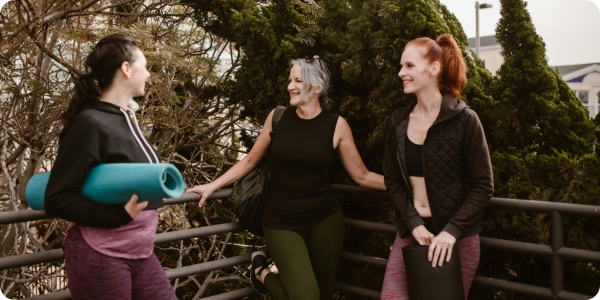
Menopause is a natural stage of life, usually occurring between ages 45–55, when periods stop and levels of the hormone oestrogen fall. This hormonal change can bring both physical and emotional symptoms that affect daily life — from hot flushes and fatigue to changes in mood and sleep.
At e-Surgery, we understand that menopause affects every woman differently. Whether you’re using Hormone Replacement Therapy (HRT), or exploring lifestyle changes, small daily habits can make a big difference to how you feel, now and in the years ahead.
This blog focuses on nutrition, exercise, and lifestyle strategies that support your health during and after menopause, even if you’re taking HRT.
Nutrition: What to Focus On
Bone Health
Falling oestrogen can speed up bone loss, increasing the risk of osteoporosis. HRT helps protect bones, but nutrition plays a vital role too.
Calcium – Aim for around 700 mg/day from:
- Dairy foods (milk, yoghurt, cheese)
- Fortified plant-based alternatives (check the label for added calcium)
- Tofu (calcium-set), leafy greens, sesame seeds
Vitamin D – Supports calcium absorption and bone strength.
- Found in oily fish, eggs, and fortified foods
- The UK recommends a daily 10 mcg supplement in autumn and winter (or year-round if you have limited sun exposure)
Protein – Helps maintain muscle and bone.
- Include at every meal: meat, poultry, fish, eggs, dairy, beans, lentils, nuts, and seeds
Heart Health
After menopause, your risk of heart disease rises due to hormonal changes. Support heart health by:
- Choosing fibre-rich foods like wholegrains, pulses, fruits, and vegetables
- Including healthy fats such as olive oil, avocados, nuts, seeds, and oily fish (salmon, mackerel, sardines)
- Limiting saturated fats — reduce butter, cream, fatty meats, and pastries
- Reducing salt intake to below 6 g/day to help manage blood pressure
Weight and Metabolism
Metabolism can slow with age, and body fat distribution may change. Excess weight can worsen menopausal symptoms and increase the risk of heart disease and certain cancers.
To maintain a healthy weight:
- Eat regular, balanced meals (avoid skipping meals)
- Watch portion sizes
- Choose high-fibre and protein-rich foods to stay full longer
- Limit sugary snacks and drinks
- Stay active (see below)
Iron and Energy
If you still experience occasional periods or heavy bleeding, you may need extra iron.
Iron-rich foods: lean red meat, lentils, beans, spinach, fortified cereals
- Pair with vitamin C foods (tomatoes, peppers, berries) to boost absorption
- Avoid tea, coffee, or other caffeinated drinks with these meals, as they can reduce absorption
Phytoestrogens
Phytoestrogens are plant compounds that act in a similar but much weaker way to oestrogen. Some women find they help reduce hot flushes, though evidence is mixed.
Found in soy products (tofu, soy milk, edamame), flaxseeds, chickpeas, and lentils. Try including these regularly as part of a balanced diet.
Physical Activity
Exercise supports bone strength, heart health, mood, weight management, and sleep.
Aim for:
- 150 minutes of moderate-intensity activity per week (brisk walking, cycling, dancing, or swimming)
- 2 strength-training sessions weekly (weights, resistance bands, yoga, or Pilates)
- Balance and flexibility exercises such as tai chi or stretching to reduce fall risk
Small changes add up! Take the stairs, walk to the shops, or stretch during TV breaks.

Alcohol and Caffeine
Alcohol
Too much alcohol can worsen hot flushes, disturb sleep, and increase the risk of breast cancer and osteoporosis.
- Limit to no more than 14 units per week, spread over several days
- Have a few alcohol-free days each week
Caffeine
If caffeine worsens anxiety, sleep problems, or hot flushes:
- Try decaf coffee or herbal teas
- Reduce gradually to avoid withdrawal headaches
Smoking and Menopause
Smoking can:
- Bring on menopause earlier
- Increase the severity of hot flushes
- Raise the risk of heart disease, osteoporosis, and certain cancers
Quitting is one of the best things you can do for your health. We offer online prescription treatments to help you quit smoking safely and effectively.
Learn more about quitting smoking with e-Surgery
Sleep and Stress
Sleep problems, night sweats, and mood changes are common during menopause. Support better sleep and emotional wellbeing by:
- Keeping a consistent bedtime routine
- Making your bedroom cool, dark, and quiet
- Avoiding screens an hour before bed
- Reducing evening caffeine and alcohol
- Trying relaxation techniques such as deep breathing, gentle stretching, journaling, or meditation

Supplements
While HRT can reduce some nutrient needs, certain supplements may still be beneficial:
- Vitamin D: 10 mcg/day (especially in autumn and winter)
- Calcium: if your dietary intake is low
- Magnesium or B vitamins: may help with energy, mood, and sleep
- Herbal remedies: such as St John’s Wort, black cohosh, ashwagandha, or red clover but always check with your GP before use, as they can interact with medications
When to Seek Support
If menopausal symptoms continue to affect your quality of life even while on HRT speak with your GP. Your treatment may need adjustment, or you could explore non-hormonal options.
Remember, menopause is a natural stage of life, but you don’t have to face it alone. With the right support, treatment, and lifestyle choices, you can protect your long-term health and feel more like yourself again.

Need personalised menopause support?
At e-Surgery we can provide HRT consultations, nutritional advice, and ongoing care, all from the comfort of your home.









